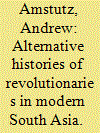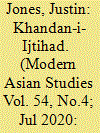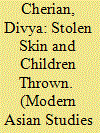|
|
|
Sort Order |
|
|
|
Items / Page
|
|
|
|
|
|
|
| Srl | Item |
| 1 |
ID:
167569


|
|
|
|
|
| Summary/Abstract |
This review essay discusses two recent monographs on revolutionaries and political violence in South Asia, Kama Maclean’s A Revolutionary History of Interwar India: Violence, Image, Voice and Text (2015) and Durba Ghosh’s Gentlemanly Terrorists: Political Violence and the Colonial State in India, 1919-1947 (2017). Ghosh and Maclean’s books contribute to an expanding body of scholarly work on anticolonial politics in India, a rich historiography on liberalism in the British Empire, and studies of visual culture and oral histories in modern South Asia. Specifically, Maclean’s A Revolutionary History centers on the Hindustan Socialist Republican Army (HSRA) in Punjab and Delhi in the late 1920s and early 1930s. Maclean reconfigures the political terrain of India’s independence struggle and illustrates the importance of revolutionary violence in nonviolent politics through unstudied visual sources and oral histories. In turn, Ghosh’s Gentlemanly Terrorists focuses on Bengal, particularly revolutionaries in the Anushilan Samiti and Jugantar from 1919 to 1947. Complicating the history of colonial constitutionalism as a gradual expansion of rights and representation, Ghosh demonstrates how constitutional reforms that aimed to promote liberal governance in India were tied to repressive emergency legislation. This review essay addresses how Gentlemanly Terrorists and A Revolutionary History contribute to ongoing efforts to rethink both the political chronology and the wider political landscape of interwar India by incorporating revolutionaries into the story of independence. It also considers how Maclean and Ghosh creatively utilize non-state archives and vernacular sources, in conjunction with colonial records, to follow the retelling of revolutionary histories in different media.
|
|
|
|
|
|
|
|
|
|
|
|
|
|
|
|
| 2 |
ID:
174423


|
|
|
|
|
| Summary/Abstract |
Revisiting the debate on how Islam's ‘learned men’ (‘ulama) have sustained their religious authority through changing historical circumstances, this article offers a longue durée account of the so-called ‘Khandan-i-Ijtihad’: a family of renowned scholars and jurists who have held scholarly and popular precedence within South Asia's Shi‘i clerical networks for some 250 years. Instead of analysing the ‘ulama as a corporate group or a class of religious professionals, this article examines the ‘ulama as members of households (khandan, khanwadah) and emphasizes the important role of family lineage and inherited social influence as conduits of clerical leadership. Tracing both the genealogical succession and the vocational enterprises of this family over several generations, the article proposes a framework for understanding an individual scholar's relationship with the collective household, arguing that a cleric's own reputation (hasab-va-nasab) rests on a mingling of ancestral pedigree and personal achievement, with the stature of individual and household perpetually affirming and reinforcing each other in the making of Islamic clerical authority. Furthermore, the article establishes the importance of the ‘ulama-biography (tazkirah) as itself a mechanism for actively sustaining the relevance of contemporary ‘ulama, by perpetually memorializing their ancestors.
|
|
|
|
|
|
|
|
|
|
|
|
|
|
|
|
| 3 |
ID:
179917


|
|
|
|
|
| Summary/Abstract |
What did women's bodies in pre-colonial South Asia have to do with the birth of capitalism? South Asia's pre-colonial integration into a globally emerging, early modern capitalist order reached deep into the hinterland to transform both state and society in eighteenth-century Marwar. Driving the change was an emergent elite, consisting largely of merchants, that channelled its energies towards reshaping caste. Merchants, in alliance with Brahmans, used their influence upon the state to adjudicate the boundary between the ‘illicit’ and the ‘licit,’ generating in the process a typology and an archive of deviant sex. In the legal framework that generated this archive, women were configured as passive recipients of sexual acts, lacking sexual personhood in law. Even as they escaped legal culpability for ‘illicit’ sex, women experienced, through this body of judgments, a strengthening of male proprietary controls over their bodies. Alongside, the criminalization of abortion served as a means of sexual disciplining. These findings suggest that post-Mughal, pre-colonial state formation in South Asia intersected with global economic transformations to generate new sex-caste orders and archival bodies.
|
|
|
|
|
|
|
|
|
|
|
|
|
|
|
|
|
|
|
|
|